Text

PSYCHO-PASS: Providence - According to Japanese Twitter
After a long wait (or maybe it just felt long to me), PSYCHO-PASS: Providence finally hits North American theaters this week (14 July 2023), before becoming more widely internationally available in early August.
Unfortunately, as I'm not currently in Japan, I've not yet seen it. Fortunately, I speak Japanese, so I've read pretty much everything I could find about what happens. If you're like me and can't wait to see it in cinemas/don't mind major spoilers, this post is for you.
What follows is a compilation of everything my sister and I know about PPP -- drawing from fan talk on Twitter, director and writer interviews and tweets, and other official promotional materials only available in Japanese -- without actually having seen it.
We also explain some of the major plot points and go into detail on the real-life works referenced in the film, so if you watched it but feel like you could still use some clarification (as many Japanese fans did), this post might be for you too.
Once again, this post is nothing but spoilers (to be taken with several grains of salt as there is a certain amount of guesswork involved), so read on at your own risk.
*Note: "SN" denotes tweets/quotes by director Shiotani Naoyoshi.

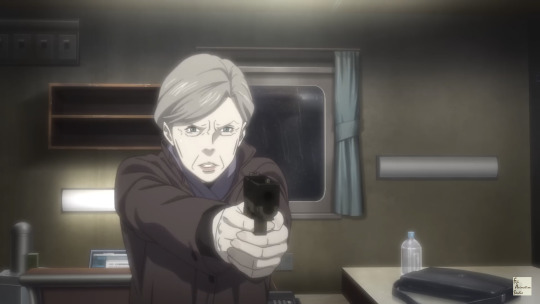
We open on a snowy, stormy night, January 2118 (2 months post-SS Case.3).
A team of armed mercenaries board a transport ship off the coast of Kanagawa, Japan and set about killing the Ministry of Foreign Affairs (MOFA) Suppressing Action Department (SAD) agents on board.
Among them is Kai Mikhaylov, a Russian agent with a large burn scar on the left half of his face.
Kai Mikhaylov (VA: Kase Yasuyuki): A member of the “Peacebreakers.” In order to obtain the Stronskaya Document, he launches an attack on the ship Milcia is on.
Leading the mercenaries is fellow mercenary Bokamoso Murray, who sports distinctive red dreadlocks.
Bokamoso Murray (VA: Shirokuma Hiroshi): A combatant affiliated with the “Peacebreakers.” He operates in tandem with Kai Mikhaylov; beginning with the assault on the Grootslang, he works to seize the Stronskaya Document.
For the record, the Grootslang (the ship’s name) is a mythical giant snake rumoured to dwell deep in a cave in the Richtersveld, South Africa. It’s said that anyone who encounters it will meet with misfortune. Well then.
Indoors on the same ship, we find Dr Milicia Stronskaya, who has been invited to Tokyo from Russia to participate in an important political conference.
Milcia Stronskaya (VA: Tsuda Shōko): A researcher and global authority on behavioural economics and statistics. She establishes the basic theory simulation referred to as the “Stronskaya Document.”
Realising the ship is under attack, she hurriedly sends a communication to someone, apologising under her breath as she does so.
She pulls out a gun just as a helmeted mercenary bursts into the room, and she shoots him dead. You can tell from how she handles it that she’s competent.
Kai charges in next, dodging her shots and pinning her down.
Leaning over her, Kai calls her “professor,” at which she startles. He then says to her, “There’s nowhere left to run.”
Kai shoots Dr Stronskaya, killing her.
Bokamoso shows up then and says to Kai, “You screwed up, huh, Kai,” and “We’re switching to Plan B.”
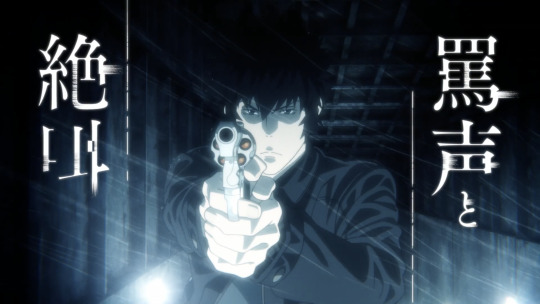
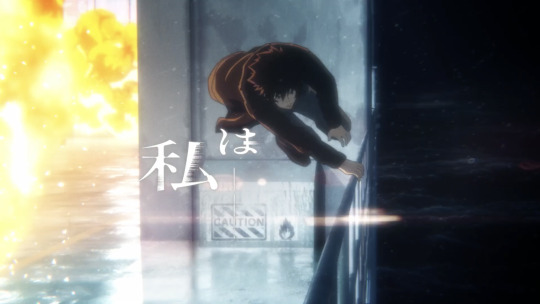
Meanwhile, Kogami Shinya, one of our two main protagonists, heads to her rescue.
Kōgami Shinya (VA: Seki Tomokazu): Special Investigator, Suppressing Action Department, Overseas Coordination Bureau, Ministry of Foreign Affairs. Age 33. He was living a nomadic life abroad acting as a mercenary but was recruited by Frederica and returned to Japan; currently, he’s pursuing international incidents. He prides himself on his advanced combat techniques and honed physique.
Kogami makes an insane jump from an aircraft wearing a wingsuit. (I’ve seen him described alternately as Batman, Captain America, and a flying squirrel here lol)
SN: What colour suits a man who flies... Thinking about it.
Kogami proceeds to fight his way through the enemy soldiers with his typical efficiency.
Unfortunately, he arrives too late to save the professor, and the mercenaries have already absconded with her head. The reason for this is explained later.
On deck, Bokamoso and his team board their aircraft and make their escape.
Kogami, who has followed them out, takes aim at the aircraft but is tackled to the deck by a reanimated SAD agent. The man’s mouth doesn’t move but we hear a voice quoting what appears to be a passage from a religious text.
An explosion goes off and Kogami breaks free of his attacker and escapes the conflagration by jumping into the ocean.
Backlit by the flames and treading water, Kogami — vexed but composed as usual — reports on the situation via his device.
<<Opening Credits>>
OP: 「アレキシサイミアスペア」 (alexithymiaspare) ~ 凛として時雨 (Ling tosite sigure)
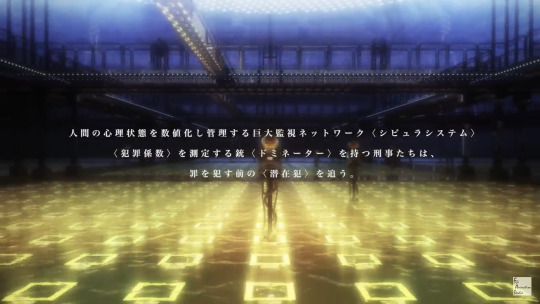
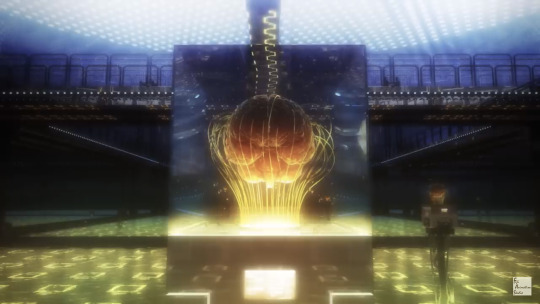
We cut to the opening credits, set to Ling tosite sigure’s “Alexthymiaspare.” The group also contributed to the soundtracks for PP1, PP2, and PP: The Movie (M1), so this is one of many ways in which the film “returns to its roots.”
The credits are then followed by a brief shot of the Sibyl System accompanied by the following text:
《"The Sibyl System," a vast surveillance network that assigns numeric values to and governs human beings’ mental states. Detectives who carry "Dominators" — guns that measure "crime coefficients" — pursue "latent criminals" before they commit crimes.》


The next morning, our other main protagonist, Tsunemori Akane, now Chief Inspector of the CID, attends a meeting of senior bureaucrats to discuss the proposed abolishment of the Ministry of Justice and the old system of law.
Tsunemori Akane (VA: Hanazawa Kana): Chief Inspector of the Ministry of Health and Welfare’s Public Safety Bureau. Age 25. She commands the Public Safety Bureau’s Criminal Investigation Department. She possesses an incontrovertible sense of justice and a stalwart mentality that makes it difficult for her Hue to cloud; she makes an appeal for maintaining the law under the Sibyl System.
The official name of the conference, which is being held at Nona Tower (i.e. the Ministry of Welfare’s HQ), is “Review Meeting on the Topic of the Overseas Expansion of Industry RE: the Sibyl System.”
Shindo Atsushi — father to PP3 protagonist Shindo Arata — is also in attendance, alongside officials from the Ministry of Health and Welfare, the Ministry of Public Management, Home Affairs, Posts and Telecommunications, the Ministry of Justice, and the Ministry of Foreign Affairs.
Shindō Atsushi (VA: Sugō Takayuki): Director-General of the Statistics Department, Minister’s Secretariat, Ministry of Health and Welfare. One of the elite who started his career as an Inspector [at the CID] and entered the MHW. He’s involved in the exportation of the Sibyl System, immigration policy, etc.
For the record, this is the same conference that Dr Stronskaya was originally scheduled to attend at Atsushi’s invitation.
Akane is the only woman and by far the youngest person present, but she doesn’t hesitate to say her piece. When it’s her turn to speak, she opens by saying, “‘Under the Sibyl System, the law is unnecessary.’ Is that truly the case?”
Akane is basically the sole voice of dissent, while Atsushi assumes a more neutral position.
During the meeting, Atsushi receives a text message, which he checks covertly before stashing his device in an inner pocket of his suit jacket.
Moments later, Akane receives a red alert on her device and excuses herself.
Atsushi calls a break in the meeting while Akane steps out to take a call from Mika.
Shimotsuki Mika (VA: Sakura Ayane): Inspector, Division 1, Criminal Investigation Department, Public Safety Bureau, Ministry of Health and Welfare. Age 21. The youngest Inspector ever inducted. At the time, she took a negative stance towards Akane’s way of thinking, but the two have a good working relationship now. She’s competitive but possesses both presence of mind and rational judgement.
Director Shiotani tweeted a quote by Rousseau that I saw someone identify as having been in reference to this scene. It’s not clear to me though whether a character quotes it aloud, or if Shiotani just meant it as an overarching theme:
SN: “Keep this truth ever before you—Ignorance never did any one any harm, error alone is fatal, and we do not lose our way through ignorance but through self-confidence.” by.Rousseau
from Rousseau’s Emile (On Education), Book III
SN: “Real knowledge is knowing the extent of one’s ignorance.”〈matcha emoji〉
from Confucius’ Analects II, Political Philosophy
Keep reading here.
#psycho pass#psycho pass: providence#PPP#akane tsunemori#tsunemori akane#kogami shinya#ginoza nobuchika#spoilers#foundintranslation#サイコパス#常守朱#狡噛信也#宜野座伸元#塩谷直義#Sugou Teppei#Kunizuka Yayoi#Karanomori Shion#Hinakawa Sho#Shimotsuki Mika#SaigaJouji#Hanashiro Frederica#Shindo Arata#Kei Mikhail Ignatov#PP1#PP2#PP3
78 notes
·
View notes
Text
Announcement: ‘Found in Translation’ now live
Hi All!
So it’s been roughly half a million years since I last posted, but I wanted to share part of what I’ve been up to in the meantime.
There are a lot of things that tumblr does well, but archiving isn’t one of them. And since I’m the queen of monster posts full of linked references and cross-references, I thought some of them might be better hosted on a site that allows for easy navigation and recall. That site is called Found in Translation and it is now (finally) live.
The other fun thing about Found in Translation is that it’s a joint effort between my sister and me, where we explore and geek out about language, culture, and translation through the lens of some of our favorite shows. That means that there is also a lot of novel content on the site that I’ve never shared here.
If you have the chance, please take a look and let us know what you think! It’s still very much a work in progress and we’d love any feedback you’re willing to share. ❤︎ You can visit the site here.
12 notes
·
View notes
Photo

The Snowdrop Controversy: Debunked
Why everything you think you know about the Snowdrop controversy is probably false (and why you should really watch the drama and judge it for yourself).
The original version of this post can be found here.
As is the unfortunate nature of these things, language barriers are no match for the powers of disinformation. The goal of this post, then, is to break down the Snowdrop controversy (설강화 논란) as comprehensively and succinctly as possible. If you know me at all by now, you know that I do comprehensive well and succinct far less well, but I’m going to give it my best shot!
Overview
How It All Started
Main Criticisms/Accusations
Denigration of the Democratization Movement
Romanticization of the ANSP/Dictatorial Government
Distortion of History
Additional Criticisms
Character Names
Jung Hae In Harper’s Bazaar Korea Interview
Fiction & Fact → A rapid-fire what’s what. If you read nothing else, read this!
Where We Are Now
Korea Communications Standards Commission (KCSC) Ruling
Legal Action
From the Korean Fans
Final Thoughts
How It All Started
The controversy surrounding Snowdrop is largely twofold. The first line of accusations began at an early stage in the production process with false rumours that the drama was being produced using Chinese investment capital. This occurred amidst an atmosphere of widespread anti-Chinese sentiment within South Korea. So, rumoured Chinese involvement — that’s the first one.
The second major set of criticisms began with the leaking of the series synopsis in March of 2021. It was at this point that rumours of, ‘a North Korean spy leading the democratization movement’ first began to spread. Another rumour claimed that the female protagonist was participating in the democratization movement whilst knowingly in love with a North Korean spy. In truth, the words ‘democratization movement’ (민주화 운동) appeared nowhere in the leaked synopsis. Here’s what it actually said:
1987 Seoul.
An era in which tear gas exploded like firecrackers.
A man covered in blood tumbles into a women’s university dormitory.
The female protagonist, convinced he’s a student activist fighting for the cause of the era,
hides him and treats his wounds even amidst strict surveillance and grave peril.
Never even dreaming that the man she’s fallen in love with somewhere along the way is an armed espionage agent.*
As the male protagonist, who survived hellish training to become a warrior equal to a hundred, has to complete the mission given to him by his homeland,
He is caught in the fate of having no choice but to aim a gun at the woman who saved him, at the first woman he’s ever come to love.
Though she’s someone he wants to save without fail, by any means, at all costs.
Through the ardent love of these two protagonists we want to show you.
Whether it’s truly good for us* to continue living this way...
Whether it’s truly okay for us to continue living forever as strangers, as enemies...
*n.b. The word being understood to mean ‘North Korean spy/agent’ here is ‘kancheop’ (간첩), which literally just means ‘espionage agent’ but is often used to refer to North Korean agents more specifically. The ‘us’ in the final lines refers to the Korean people, North and South. You can find the original Korean here.
So, the female protagonist mistakes the male protagonist for a student activist and so hides him and treats his wounds, falling in love with him whilst having no idea he’s actually a North Korean spy. The male protagonist, despite loving her back, ends up having no choice but to hold her at gunpoint for the sake of accomplishing his mission. Love across battle lines. Unity amidst division — that’s the premise.
Despite this, early drivers of the controversy began uploading posts to websites like TheQoo (a.k.a. “Murder Qoo”) featuring images of the synopsis with titles designed to spark outrage, accompanied by descriptions that weren’t representative of the synopsis’ actual content (e.g. a North Korean agent leading the democratization movement, etc.). Other netizens who saw the posts became predictably outraged and proceeded to spread the (dis)information without actually stopping to read the synopsis itself (classique). These falsehoods rapidly devolved into established ‘facts.’
Since this was all happening well before the drama began airing, there was little anyone could do to refute the claims without spoiling the plot. JTBC released a series of statements on March 26 (Eng.) and March 30, 2021 (Eng), attempting to set the record straight, to little effect. As one Korean fan described it to me:
“They (those spreading falsehoods) made use of the fact that no one could refute their claims since the drama hadn’t aired yet. Because there wasn’t anyone to object, the lies became truths, and they were able to frame the drama in such a light that, before a lot of people had ever even seen it, they already disdained it enough that they didn’t even care to confirm whether any of it was true.”
When the drama finally began airing in December 2021 and it became clear that there wasn’t any content denigrating the democratization movement, criticism refocused on accusations of the ‘romanticization of the Agency for National Security Planning (ANSP)’ and ‘historical distortion.’ As with the synopsis, these criticisms weren’t substantiated by the actual content of the drama, but by this point, casual critics were too stubborn to admit they were wrong, and those actively driving the controversy remained hell-bent on doing so. They accomplished this by taking select scenes and/or lines out of context and disseminating them with intentionally distorted ‘descriptions.’ As a result, a large majority of those criticizing that drama did so without ever having actually watched it, relying instead on the intentionally distorted information being circulated online.
The following section offers a brief overview of some of the main criticisms aimed at Snowdrop and why they were considered to be so problematic.
Main Criticisms/Accusations
Quick note on history before we get down to things:
For those who aren’t already familiar, South Korea was under the control of a military dictatorship for most of the 1960s~80s. During these years, many who participated in the pro-democracy movement were imprisoned, tortured, and/or killed by the Agency for National Security Planning (1981-1999) and its predecessor, the Korean Central Intelligence Agency (1961-1981), the enforcer arms of the Chun Doo Hwan (1980-1987) and Park Chung Hee (1961-1979) regimes, respectively. On paper, the ANSP was South Korea’s preeminent intelligence organisation, charged with ‘the collection, compilation, and distribution of foreign and domestic information regarding public safety against communists and plots to overthrow the government.’ In practice, they carried out a brutal communist witch hunt against anyone who opposed the regime.
For a 30,000 ft overview of the recent history of the Korean Peninsula, check out this helpful post .
Denigration of the Democratization Movement (민주화 운동 폄훼)
Note: While the term ‘democratization movement’ may refer to the fight for democracy in South Korea as a whole, there are also two more specific ‘movements’ it’s often used in reference to. Those are:
・The 5.18 Democracy Movement of May 18~27, 1980 (aka the Gwangju Uprising; the Gwangju Massacre)
・The 6.10 Democracy Movement of June 10~29, 1987 (aka the June Uprising; the June Struggle)
This particular set of criticisms accounts for the majority of the controversy that occurred prior to when Snowdrop actually began airing and often gets paired with accusations of the ‘romanticization of North Korean spies’ (북한 간첩 미화), due to the false claims that the male protagonist, Soo Ho, is a North Korean secret agent involved in/leading the democratization movement. Accusations along this line include:
① Criticisms having to do with the character set-up of the male protagonist
Despite the fact that there really have been numerous incidents of North Korean agents discovered in South Korea, critics claimed that this premise lent justification to the illegal torture conducted by the ANSP as part of the ‘public security’ investigations of the 1970s and 80s. In particular, given the fact that many student activists were framed as communist spies and tortured or killed, some claimed the premise that there really was a North Korean spy among them seemed to justify the ANSP’s investigation, imprisonment, and torture of student demonstrators under the pretext of ferreting out North Korean spies. Given that the discovery of North Korean operatives in South Korea is a historical fact, this seems like a bit of a stretch.
Another criticism that arose regarding the character has to do with his cover as a Korean residing overseas in Germany attending the University of Berlin, which some claimed recalled the 1967 East Berlin Affair (동백림 사건) and the 1969 European North Korean Spy Ring Fabrication Incident (유럽 간첩단 조작 사건). To briefly summarize the first incident, the South Korean Central Intelligence Agency announced in 1967 that 194 Koreans residing or studying abroad in Eastern Europe had entered the North Korean embassy in Berlin and were operating as spies. This lead to the framing of musician Yun Isang and painter Lee Ungno, as well as the torture and crippling of poet Chon Sang Byeong. If you’re like me, you’re probably asking yourself how any of this is relevant. Answer: it isn’t.
② Claims that the premise appears to be lending credence to the theory that North Korea intervened in the 5.18 Democracy Movement*
Some critics claimed that the drama was depicting the Public Security State’s (i.e the Chun Doo Hwan regime’s) assertions throughout the 1980s that the 5.18 Democracy Movement was instigated by people receiving orders from North Korea as historical fact. Keep in mind, Snowdrop has nothing to do with the democratization movement. It centers on fictional events surrounding the 1987 presidential election. What’s more, this allegation is based on the fabrication that Soo Ho is somehow involved in the democracy movement as a North Korean spy (he’s not).
*n.b. The 5.18 Democracy Movement (오일팔 민주화 운동) is alternately known as 5.18 (오일팔), the Gwangju Democracy Movement (광주 민주화 운동), the Gwangju Uprising (광주 인민 봉기), The Gwangju Democratization Struggle (광주 민주화 항쟁), or the Gwangju Massacre.
③ Suspicions that the character ‘Eun Young Cho’ is based on a real person
The female protagonist, Eun Young Ro, was originally named ‘Young Cho,’ which is an unusual name. This led some to suspect it was taken from real-life student activist and democracy movement leader, Chun Young Cho, who resisted the Yushin Reforms of the Park Chung Hee regime during the 1970s. In addition, her husband, Jung Mun Hwa, was framed as a North Korean spy and tortured during the People’s Blue Federation Incident (민청학령 사건) in the early 1970s, dying of malnutrition at a young age. This was considered problematic in conjunction with the fact that the drama’s male lead is a North Korean spy.
④ Criticism of the inclusion of the protest song, ‘Oh Pine, Oh Pine, Oh Verdant Pine’*
During a scene in which the male protagonist (a North Korean spy), flees pursuit by the ANSP, the music heard in the background is ‘Oh Pine, Oh Pine, Oh Verdant Pine.’ Critics claimed that it was disrespectful to score such a scene with a famous protest song. The thing is, the song wasn’t inserted as BGM to score the scene. It was being sung within the drama itself by the crowd of student protestors that Soo Ho and his ANSP pursuers ran through while they chased him.
*n.b. I watched the JTBC version (the version broadcast in Korea) which does include the song, but I’m told it actually doesn’t appear in the Disney+ (US) version, so if this is news to you, that may be why. For anyone curious, you can watch a clip of the JTBC version with the song included here.
Romanticization of the ANSP/Dictatorial Government (안기부/독재정권 미화)
This group of criticisms has to do with the alleged romanticization* of the New Military Group (신군부) and the Agency for National Security Planning (ANSP). Accusations along this line that appeared from before the drama began airing include:
① The second male lead is an ANSP Team Leader (and the ANSP is where student activists were tortured)
This is in reference to the character Lee Gang Mu, who is the ‘second male lead’ of Snowdrop in the literal sense that he’s the male deuteragonist. The assumption here was that he would share a loveline with Young Ro, who was being made out to be a student activist — another rumour which proved false. If this were in any way true, I would hope that people would also be concerned by the fact that they’re age 36 and 20, respectively. Fortunately for everyone, no such loveline exists.
② The second male lead is described as ‘straight as an arrow’ (‘대쪽같은 인물’)
To begin, the phrase ‘straight as an arrow’ (i.e. straightforward; single-minded), doesn’t actually appear in Gang Mu’s character profile, at least, not in those terms. The larger criticism, though, is that he’s portrayed positively when he should be a villain. Again, without giving too much away, Gang Mu may work for the ANSP, but he has his own motivations for doing so. In fact, what it does say in his profile is that he was, ‘disillusioned when he saw that the ANSP didn’t catch spies but rather ‘made’ them (referring, of course, the to way the ANSP framed dissenters as communist spies to suppress opposition and fill quotas). Gang Mu has his own character arc in the drama that’s worth keeping an eye on. In many ways, he acts as a foil for Soo Ho.
After the drama began airing, more specific criticisms were added to this, including things like:
‘The fact that the ANSP managed to capture an actual North Korean spy (Park Geum Cheol) is in itself romanticizing the ANSP.’
ㅋㅋㅋ Okay, this one’s just funny. I get that what they mean is that the fact of them capturing an actual spy would seem to justify their communist witch hunt (I’m not sure it does), but it just sounds like they’re complaining that portraying them as even remotely competent is a lie.
‘In EP03, the character Lee Gang Mu has a line saying, “Were you also following the principle of submission to our superiors’ orders when you rounded up random people without any evidence and made them out to be spies?” Depicting the ANSP as having people like Lee Gang Mu among its ranks is romanticizing the ANSP.’
Setting aside what I’ve already said on the character above, I think it would actually be less realistic to portray them as a monolith of evil. There’s something important to be said about evil as the result of the complacency of regular everyday people (I’m thinking of Dong Jae here).
*n.b. What I’ve translated as ‘romanticization’ here and above is the word ‘mihwa’ (미화), which is more literally ‘beautification,’ but can be understood to mean ‘romanticization,’ ‘sanitization,’ or ‘glorification.’
Distortion of History (역사 왜곡)
This last category is in many ways a ‘catch-all’ category for any other criticism aimed at the drama, big and small. The term first appeared in conjunction with accusations that the drama was ‘distorting’ the events of 5.18 (see above) and glorifying the military government, but turned to more specific grievances once the drama began airing and this was proved false. These included things such as:
‘It’s unrealistic that Hall Director Pi would be able to bar the ANSP from searching the dorm without a warrant. In reality, they would have just ignored her and used force/violence. It’s a historical distortion to portray them as reasonable investigators.’
I can see where this may be true, but I can also see where it’s necessary in service of the plot. It’s not that they’re being intentionally portrayed as ‘reasonable’ so much as that it’s necessary narratively that they be delayed in order to buy the protagonists time (even if it seems somewhat unlikely).
‘During the protest in EP01, the riot police shoot the tear gas into the air over the protestors’ heads when they should have fired directly into the crowd.’
Technically, they were meant to fire 45 degrees over the crowd’s heads, as portrayed in the drama (more on that here). But yes, in reality, they often shot into the crowd. That said, doing so would have posed a significant risk to the actors, so this strikes me as more than a little unreasonable.
‘It’s a historical distortion that the economic brain of the minority party (Han Yi Seop) would have met with a North Korean spy.’
(The entire plot is fictional)
My greatest problem with these criticisms is that they appear not to distinguish between ‘distortion’ and ‘fiction.’ The drama is historical fiction, as it has claimed to be from the very beginning. So pointing to elements of the drama that diverge from historic reality or require the viewer to suspend disbelief and calling them ‘distortion’ strikes me as intentionally missing the point. I’ll return to this below, but a third-party investigation into the drama ruled that no such distortion had occurred.
Additional Criticisms
Character Names
① ‘Soo Ho’s surname ‘Im’ (임) is an intentional allusion to a real-life student democracy activist, Im Jong Seok.’
Actually, the surname was selected in service of a play on words. As I’ve explained elsewhere, Soo Ho’s name (守護) means ‘protection’ or ‘guardian,’ and while his last name, ‘Im,’ is written with the character for ‘grove’ (林), Young Ro interprets it as the ‘im’ from ‘imja,’ an antiquated term for one’s love. So his name sounds like ‘protecting his love’ or ‘protector of his love.’ The last name ‘Im’ was selected for this reason. This also feels like a bit of a stretch, considering that ‘Im’ is the 10th most common last name in South Korea, and the first names aren’t even remotely similar.
② ‘Young Ro’s original character name, ‘Eun Young Cho’ (은영초), is a reference to real-life student democracy activist Chun Young Cho.’
Though the production company (JTBC) claims there was no relation, they ended up changing the character’s name to Young Ro at a late stage in the production in order to appease critics. This involved a great deal of effort, as the first couple of episodes had already been filmed using the name Young Cho, and so had to later be dubbed over using post-synchronization recording.
Jung Hae In Harper’s Bazaar Korea Interview
Another wave of criticisms came in response to an answer that Jung Hae In gave in an interview featured in the December 2021 issue of Harper’s Bazaar Korea. When asked whether he had done any additional research into the historical background of the drama, he responded that while he, “was born in 1988 and so never directly experienced the events of 1987,” he hadn’t, because he believed that, “the right answers all lie in the script.”
Some netizens interpreted this to mean that he approached the project without knowing anything about the period and historic elements, and began attacking him, criticizing his awareness of history. As you can probably tell by now, I’m the type inclined to do the background research. Objectively, though, Snowdrop is set against the backdrop of a fictional retelling of the 1987 presidential election, and the central conflict, characters, and space within which the drama unfolds are all entirely fictional as well. From the standpoint of an actor, it strikes me as within reason that any answers to how to act within such a context would be found primarily in the script.
Fiction & Fact
Fiction: Im Soo Ho is a North Korean spy who is leading/organizing the South Korean pro-democracy movement.
Fact: Im Soo Ho is a North Korean spy whom Eun Young Ro mistakes for a student activist. Soo Ho is never shown to participate in any sort of pro-democracy activity, nor does he ever claim to be a student protestor. The salient point is that Young Ro hides him because she believes this to be the reason he’s on the run from the ANSP.
Fiction: The ANSP are portrayed as heroes.
Fact: The ANSP is consistently portrayed as ruthless and corrupt. In addition to the actions taken by the various ANSP-affiliated characters (who are all a mixture of incompetent and contemptible), several of the main and supporting characters explicitly call out the ANSP’s tyranny at various points throughout the drama.
Lee Gang Mu: Surrender? You think if I get you to surrender right now they’ll accept it out there? They’re bastards who play games with the citizens’ lives to maintain their own power. ~ EP09
Im Soo Ho: Oi, ANSP Team Leader. The ANSP, who frame anyone who stands up to the government’s tyranny as a North Korean spy. The dogs of the government who trample on their blameless compatriots in the name of establishing security state. That’s the ANSP, right? Who are you to criticize anyone when you’ve been glutting yourself off the salary they give you?
Lee Gang Mu: When it comes down to it, they’re both the same, whether it’s the North Korean government that deceived Zainichi Koreans with the buksong* event, trampling on the lives of countless Koreans overseas, or the South Korean government that made a ‘public safety’ state. ~ EP09
Yeo Jeong Min: They’re people who’ll do even worse than this. My older cousin who participated in a union strike at a factory was dragged off to a re-education camp and died there. ~ EP11
Hall Director Pi: In order to win the election, the lives of some thirty people? The ANSP finds them laughable. ~ EP11
Female student: Hey, Eun Young Ro, listen well: my brother, who weighed 78kg (172lbs), was dragged off like a dog by the ANSP and became 50kg (110lbs) in just one month. He nearly surrendered but he held out at the time. In the end, though, he went mad! ~ EP11
*’Buksong‘ (북송), written with the characters for ‘north’ (북・北) and ‘send’ (송・送), refers to a ‘repatriation’ campaign by the North Korean government aimed at Koreans living in Japan.
Fiction: The North Koreans are romanticized (literally, ‘mi-hwa’ (미화), meaning ‘beautification’).
Fact: Well, if you mean Soo Ho, then I’m afraid I can’t argue. He is very pretty. But the North Korean leadership — chiefly Lim Ji Rok and Choi Soo Ryeon — are as bad, if not worse, than the ANSP/South Korean leadership. Without giving away any spoilers, calling them ‘soulless’ isn’t much of a stretch.
Fiction: Snowdrop is about the pro-democratization movement and disrespects the movement.
Fact: The plot of Snowdrop has nothing to do with the 5.18 Democratization Movement of May 18~27, 1980 (aka the Gwangju Uprising; the Gwangju Massacre), nor the 6.10 Democratic Movement of June 10~29, 1987 (aka the June Uprising; the June Struggle). The main historical backdrop for Snowdrop is not the pro-democratization movement, but rather the 1987 presidential election.
Fiction: The protagonists’ names are taken from real-life student pro-democracy activists.
Fact: The protagonists’ names were chosen by the writer for entirely unrelated reasons. Yoo Hyun Mi gave Soo Ho the last name ‘Im’ because she wanted his name to sound like ‘protector of his love’ (see above). As for Young Ro, JTBC made a public statement officially denying any connection to activist Chun Young Cho. Even so, the production company made the decision to change the name at great effort and expense in an effort to appease public concerns.
Fiction: The title (Seolganghwa) is Chinese.
Fact: The word ‘seolganghwa’ (雪降花・‘snow-fall-flower’) is registered by the National Arboretum of Korea. In China, the snowdrop plant is called ‘seoljeokhwa’ (雪滴花・‘snow-droplet-flower’) or ‘seolhwayeon’ (雪花蓮・‘snow-flower-lotus’) (these are, of course, the Korean pronunciations of the hanja, not the Chinese ones). The meaning behind the title is explained in the series description.
Fiction: Snowdrop is financed by China.
Fact: It’s true that Chinese company Tencent invested 100 billion won in JTBC STUDIO on December 29, 2020. This was after funding for the series had been secured and filming had already begun, however. More to the point, Tencent’s investment is in the form of ‘convertible preferred stocks,’ which do not provide any accompanying voting rights. This means that Tencent cannot participate in the management of JTBC STUDIO, and so naturally had no input into Snowdrop.
Fiction: Snowdrop was produced by YG Entertainment (aka Jisoo’s talent agency).
Fact: Snowdrop was produced by DRAMAHOUSE and JTBC STUDIOS. It has no relation to YG Entertainment. This particular rumor stems from anti-fans who were angry that Jisoo had been cast in the lead role despite having no previous (substantial) acting experience. It should be noted that, while her acting received mixed reviews during the earlier episodes, by the end of the drama, the reception was distinctly positive, with media headlines praising how she’d ‘earned her place as an actress.’
Where We Are Now
Korea Communication Standards Commission Ruling (방심위 결과)
On December 19, 2021, following the broadcast of the first two episodes, a national petition was started to cancel the drama for all of the reasons covered above, gaining over 200,000 signatures in just one day. The Blue House responded by submitting the drama to the Korean Communications Standards Commission (KCSC) for an investigation into the allegations of ‘historical distortion.’
After carefully reviewing the drama, the KCSC released the results of its investigation on March 18, 2022. The KCSC ruled as follows:
After having debated over the civil complaint that the drama broadcasted content that distorted history by depicting, among other things, an inappropriate connection between the democratization movement and North Korean agents and damaged the value of the democratization movement, we at the Special Commission of Broadcast Advisory have ruled that:
Due to the fact that, among other things, it depicts the ANSP as unreasonable and laughable over the course of the entire drama, it is difficult to conclude that there was any intention to romanticize the ANSP or damage the value of the democratization movement. Due to the fact that, as dramas are creative works whose right to creative expression must be guaranteed to the greatest extent possible, while it is difficult to view it as a work that inspires public confidence in [its depiction of] history, even if its content which dramatized the period used as its background does not entirely correspond with historical fact, it is difficult to view this as a problem. Accordingly, it is difficult to conclude that content in which an ANSP agent adheres to the warrant requirements or cooperates with a Northern operative in order to protect human rights, or content which employed a protest song in a scene in which the male protagonist, who is a North Korean agent, flees, as overstepping the limits of freedom of expression in such a way as to damage the value of the democratization movement and injure the dignity and pride of the Korean people. We therefore inform you that a majority of commissioners agreed that it is impossible to consider the review regulations applicable.
See also: KCSC releases investigation results over Snowdrop “history distortion” controversy.
Legal Action
On April 8, 2022, JTBC announced that it was pursuing legal action against individuals who propagated false and damaging fabrications about Snowdrop and its stars with malicious intent on counts of slander and obstruction of business. A JTBC rep stated that:
“As we forewarned, we are currently pursuing legal action against relevant individuals for maliciously inciting negative public opinion against Snowdrop,” continuing, “From before the broadcast began, the broadcast company, the production companies, and the actors have continued to suffer extensive damages,” and explained that, “The legal suit is against the act of continuously disseminating falsehoods and baseless claims that differ entirely from the drama’s content.” He also stated that, “We pursued legal action in the hope that similar situations in which the majority of people involved suffer damages don’t continue to occur.”
You can find English coverage of this here.
While we’re on the topic, I should also mention that the claim made back in December 2021 that Jisoo had filed a lawsuit against someone for their malicious comments was itself a malicious falsehood by the person claiming to be sued. When fans with legal knowledge began pointing out that the documents pictured were fake, the post was immediately deleted.
From the Korean Fans
When I first decided to write this post, I started by reaching out to Korean fans, inviting them to share how they viewed the controversy and asking them what they would like to convey to people outside of Korea (you can find that post here). These are some of the comments I received in response:
“Please tell them that they made a controversy for the sake of controversy. Even when it became clear that there was no reason for the basis of the controversy, there are a lot of cowardly people who tried to rationalize their hasty accusations made through illogical reasoning.”
“Basically, people cursed the drama out before it had even aired, and then even when it became clear that it was all untrue, they made up every kind of reason because they didn’t want to admit they were wrong. I think that’s the biggest thing.”
“If you’re talking about the controversy, the romanticization of the ANSP is the main oneㅠㅠ. The fact that it wasn’t true was all proven as the drama aired, but there are still a lot of people being stubborn *sigh*”
“Even so, when people in their right minds found out after the fact that it was all false propaganda they found it all ridiculous.”
See also this impassioned deep-dive on Naver: [Notice] Rebuttal / The Appearance of a Real-life Arrowhead? Full Summary of all the Fabrications about Snowdrop.
“How is your censorship different from the Chun Doo Hwan regime’s censorship of popular art? Are you advocating a dictatorship?”
“Just who is doing the ‘distorting’ here?”
Final Thoughts
If you’re still skeptical, or you took nothing else away from the above, I hope that I’ve at least succeeded in convincing you to watch the drama and judge it for yourself.
As I see it, the Snowdrop controversy is the result of the malicious intent of the few and the possibly well-intentioned but also poorly-informed censorship of the many. We live in a digital world saturated with clickbait taglines designed to incite outrage and discourage fact-checking. There’s also just a lot of ‘noise,’ and it’s not always easy to tell what’s true and what’s fake, especially when you have to rely on translated sources.
One reason I think I found myself skeptical from the beginning is that I was familiar with the writer. The last drama I watched by Yoo Hyun Mi was Gaksital (2012), which was set during the Japanese occupation and centered around the story of a Zorro-esque folk hero’s fight for freedom from Japanese rule. By any measure, it was a drama that championed Korean identity and the Korean people’s right to self-determination. So it struck me as unlikely that the same writer would denigrate the democratization movement. If you go back and read the leaked synopsis, I think you can detect that same sentimentality towards the Korean identity in the final lines.
As we’ve already established, Snowdrop isn’t about the democratization movement. And though it’s set against the backdrop of the 1987 presidential election, it’s not really about that, either. Snowdrop employs the premise of fictional North-South collusion over the 1987 presidential election to tell the story of individuals from both sides of the 38th parallel overcoming that which divides them. What defines heroes and villains isn’t their initial allegiances, but rather who is willing to overcome those divisions and who is only interested in gaining or maintaining their own power. It’s a story of two corrupt governments and the young people whose lives they trample underfoot, and it’s a story, first and foremost, of two young people, who meet and fall in love against all odds, and the lengths to which they are willing to go for the sake of that love.
I’ll leave you with the words of one particularly well-spoken Korean fan I encountered:
Snowdrop is the story of people who were used and sacrificed by the tragedy of their time. A story of people who, even amidst that, struggled and held-out in order to live. And it’s a story of how, even in such tragic moments, people fall in love, form friendships, and come to understand one another, a story of people living as they have through any era, and it’s a story of our lives.
Happy watching! (bring tissues)
#snowdrop#jtbc snowdrop#jisoo#jung hae in#kim jisoo#kdrama#feel free to @ me but do us both a favor and actually read through the post first <3#I realise this is super after the fact but I wanted to set the record straight#설강화#정해인#지수#임수호#은영로#설강화 논란#김지수#블랙핑크#BLACKPINK#korean culture#korean history#korean language#my translations#im sooho#eun youngro#eun young ro#eun yeong ro#im soo ho#lim soo ho#FiT
43 notes
·
View notes
Text
Wait WHAT? TotNT is getting a prequel?? It was announced last September??? Where have I been that I’m just hearing this???
It’s getting a season 2 (Japanese occupation era) AND season 3 (sageuk - so even further in the past) 🤯🤯🤯
19 notes
·
View notes
Photo
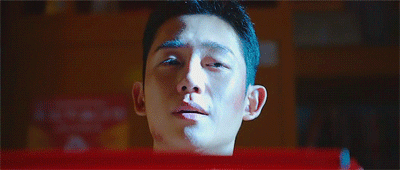
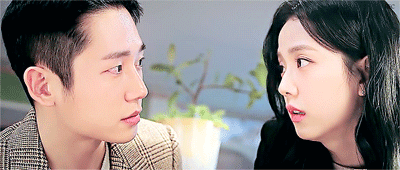
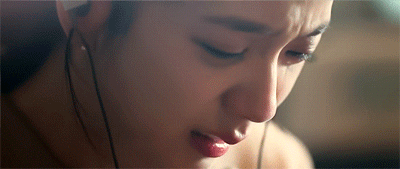
설강화 | Snowdrop - Soo Ho’s Final Love ‘Letter’ to Yeong Ro [Extended Ver.]
Eun Yeong Ro...I love you...
So it turns out that the background audio of the BTS reel for the final scene contains an extended version of Soo Ho’s final words to Yeong Ro. The two versions don’t match up exactly, but I’ve pieced them together in the way I think makes the most logical sense. Here it is translated and in the original Korean for anyone curious:
~~~
Yeong Ro-ya, I'm reminded of the first time I met you at the Rome Café.
When I saw you reaching out your hands to block the collapsing matchstick tower..
The truth is...
You’ve been in my heart since then.
If I had been an ordinary young man..
That day.. I would have asked you out on a date.
Then we... would’ve become a couple, right?
Going to the amusement park together..
Watching movies together..
Going to the beach, and singing you songs while I played the guitar...
I wanted to be with you that way, holding nothing back...
How is it that I... became someone who mustn’t be by your side?
If I’d never met you in the first place...
If I hadn’t picked up the paper airplane...
I probably would have completed my mission and departed.
But I...
Don’t regret meeting you.
Even that moment when I picked up the paper airplane..
I can’t regret it..
My Yeong Ro who made flowers bloom for me, who was so cold,
For letting me live like a person...
For letting me know love...
Really, thank you.
I’m leaving, but..
I... I...
I’ll remember you for the rest of my life.
Eun Yeong Ro... I love you...
영로야, 로마다방에서
널 처음 만났을 때가 생각 나
무너지는 성냥개비 탑을 막으려고 손을 뻗는 널 봤을 때..
사실은..
그때부터 네가 내 마음 속에 있었어
내가 만약..
평범한 젊은이었다면..
그날 난, 너한테 데이트 신청을 했을 거야
그럼 우린..연인이 됐겠지?
놀이공원도 같이 가고
영화도 같이 보고
바닷가도 가고
기타 치면서 노래도 불러주고
그렇게 원없이.. 너와 함께 하고 싶었는데…
어쩌다 난.. 네 곁에 있어선 안될 사람이 되었을까?
애초에... 널 만나지 않았더라면
내가.. 종이비행기를 줍지 않았더라면
나는 임무를 완수하고 떠났겠지
하지만 난
널 만난 거 후회하지 않아
종이비행기를 줍던 그 순간도
후회할 수가 없어
차가운 나한테 꽃을 피워준 우리 영로
사람답게 살게 해줘서
사랑을 알게 해줘서
정말 고마워
난 떠나지만..
난... 나는..
널 평생 기억할게
은영로.. 사랑해..
#I'm still not okay#설강화#임수호#은영로#정해인#지수#김지수#bts#my translations#it gets me every time he calls her 'yeong ro-ya'#but calling her 'uri yeong ro' ㅠㅠ#stab me in the heart
20 notes
·
View notes
Note
Where did you go? Haven't seen you post in a bit. You are missed.
Aww I’m still here! I haven’t been posting because I’ve been involved in a large-ish project that I’m hoping to be able to share soon. Thank you for the lovely message though. It’s nice to know I’m missed ♡♡♡
I’m also hoping to share some more content here in the not-too-distant future, so thanks for your patience in advance!
23 notes
·
View notes
Photo



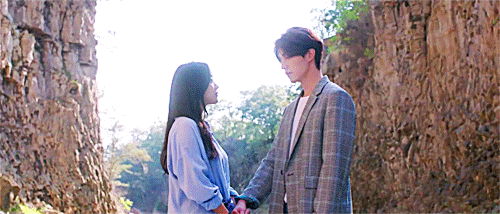

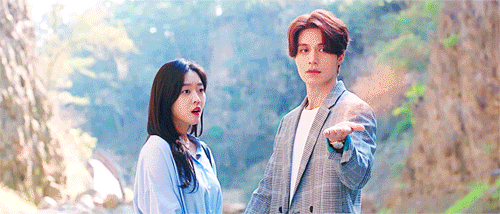




구미호뎐 | Tale of the Nine Tailed - Yeon's Affirmation
Because you aren’t the shadow of my past. I’ll look properly. I’m going to look straight on. Not at Ah Eum who has been reborn, but at you.
#tale of the nine tailed#totnt#lee yeon#nam ji ah#lee dong wook#jo bo ah#yeon x ji ah#구미호뎐#이연#남지아#이동욱#조보아#연지아#sorry about the sixth gif#I honestly don't know why it's being so shitty#and only on one side#I tried everything#rawr
82 notes
·
View notes
Photo

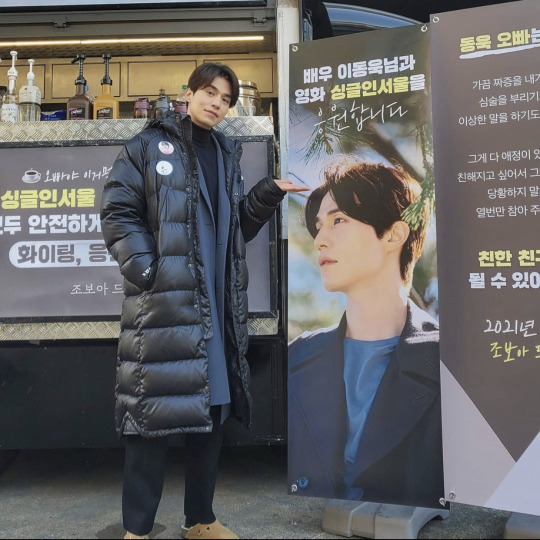


구미호뎐 | Tale of the Nine Tailed - Cast (⋈◍>◡<◍)。✧♡♡♡
More coffee truck cuteness! This time Jo Bo Ah sent a coffee truck to the set of Lee Dong Wook’s Single in Seoul, complete with an ‘Lee Dong Wook User’s Guide’ lol
The front of the truck (4th picture) reads:
Oppa-ya, eat this and gather your strength! To the all the Single in Seoul staff, please film safely ♡ Fighting, I’m rooting for you! - from Jo Bo Ah
The best part is the banner on the side though:
[To tell you] about Dong Wook Oppa
Although he sometimes gets irritated, and sometimes he’s cross, and at times he says strange things
he does it all out of affection, and because he wants to become closer. Don’t get flustered and just bear with it 10 times.
You can become close friends ♡
January 2021, from Jo Bo Ah
Lee Dong Wook shared the above photos on his Instagram with the caption:
Thanks Bbo❤️ (feat. Lee Dong Wook User’s Guide) You really do know me well 👍🏻
Note: ‘Bbo’ (뽀) is Jo Bo Ah ’s (조보아) nickname. The double ‘b’ makes it sound cute. ;)
38 notes
·
View notes
Photo

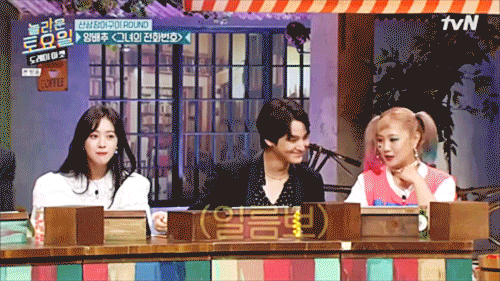
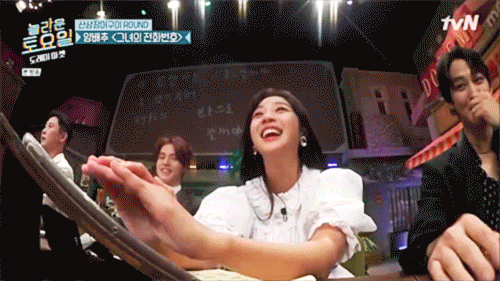
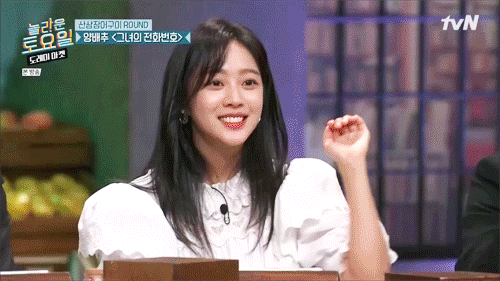

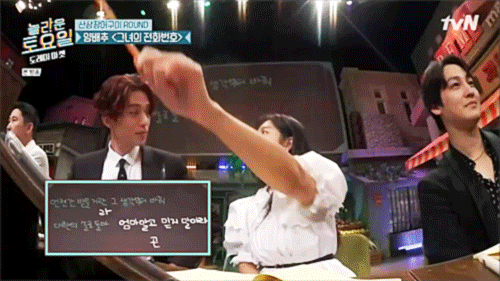
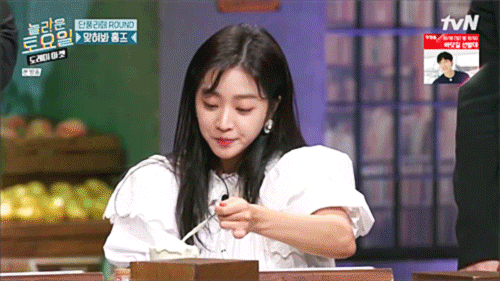

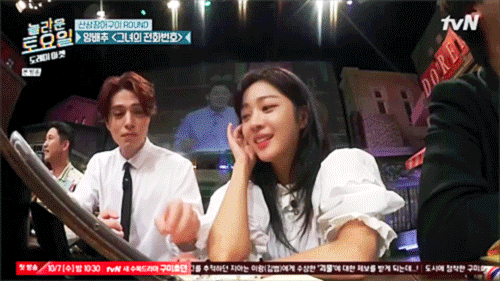

구미호뎐 | Tale of the Nine Tailed - Lee Dong Wook x Jo Bo Ah x Kim Beom on Amazing Saturday EP. 128
#tale of the nine tailed#totnt#lee dong wook#jo bo ah#kim beom#kim bum#amazing saturday#구미호뎐#이동욱#조보아#김밤#놀라운 토요일
43 notes
·
View notes
Photo
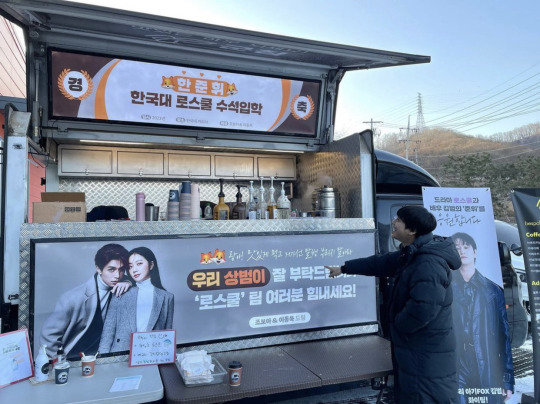

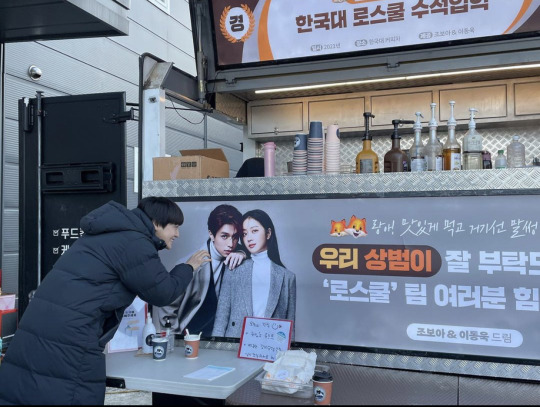
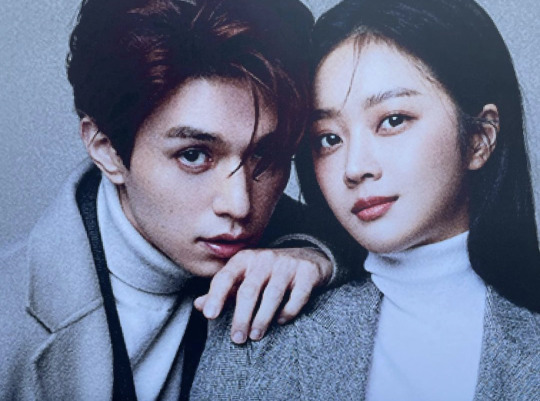
구미호뎐 | Tale of the Nine Tailed - Cast ♡♡♡
Wait, this is so cute. Lee Dong Wook & Jo Bo Ah co-sent a coffee truck to the set of Kim Beom’s Law School. It says:
🦊🦊Rang-ah! Please enjoy eating this and don’t be a trouble maker there at least.
Please look after ‘Our Sang Beom-ie.’ To everyone on the Law School Team, please keep your spirits up! - From Jo Bo Ah & Lee Dong Wook
The banner on the side says ‘our baby FOX Kim Beom, fighting!’
Kim Beom posted it on Instagram with the caption:
🤣🤣🤣🤣🤣🤣
-
My huyng and human, whom I miss
-
For the first time in a while 🦊
#tale of the nine tailed#totnt#totnt cast#kim beom#kim bum#lee dong wook#jo bo ah#why are they all so cute?#구미호뎐#김범#이동욱#조보아
85 notes
·
View notes
Video
구미호뎐 | Tale of the Nine Tailed - Interview Teaser
All rights belong to tvN
#tale of the nine tailed#totnt#lee yeon#nam ji ah#lee dong wook#jo bo ah#tvn official#my subtitles#I learned a new trick#totnt teaser#구미호뎐#이연#남지아#이동욱#조보아#구미호뎐 티저#티저 인터뷰
58 notes
·
View notes
Text
Quick PSA: So I realized after the fact that because I changed my handle all the hyperlinks to my posts are now broken (thanks tumblr). I’ve gone back through and repaired/replaced most of them, so they should work, but if you happen to encounter a broken one, please do let me know so I can fix it. =)
7 notes
·
View notes
Photo

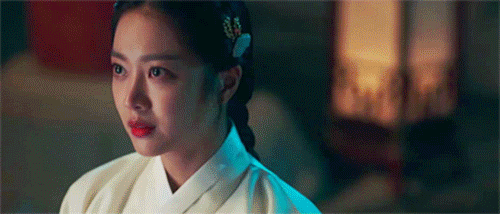





구미호뎐 | Tale of the Nine Tailed - Seventh Princess Ah Eum
Whether in the past or now, in this vast palace, you are the only one to ever recognize me.
25 notes
·
View notes
Note
I'm so grateful you translated kim beom's live! If possible I'd really love to know his response to whether rang would want to be a full fox or full human, and also his memorable lines/scenes? many thanks! <3
Hello! No problem. I’ve added the responses you requested into the original post [x] so if you go back, they should be there. =)
10 notes
·
View notes
Photo


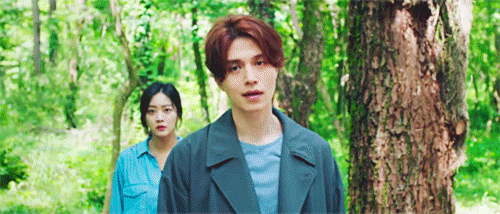
구미호뎐 | Tale of the Nine Tailed - ‘Deadball’ Explained
Rang: Aren’t we both too old to play catch?
Yeon: Our relationship is too makjang for that. That was meant to be a deadball, actually.
‘Makjang’ is a slang word taken from the phrase ‘the final scene’ (majimak jangmyeon) that has come to refer to an entire genre, as well as particular dramatic elements or conventions of Korean storytelling. Dramabeans explain the term here. When Yeon says his relationship with Rang is ‘makjang,’ he’s essentially saying it’s overly fraught.
‘Deadball’ is a Korean baseball term for a pitch that hits a player (typically causing the game to be paused). So all Yeon is saying is that he meant for the ‘ball’ to hit Rang, rather than for Rang to catch it.
#tale of the nine tailed#totnt#lee yeon#lee rang#lee dong wook#kim beom#kim bum#lost in translation#구미호뎐#이연#이랑#이동욱#김범#여우 형제#my gifs#the subs I saw for this entire scene were completely wrong so....
64 notes
·
View notes
Photo
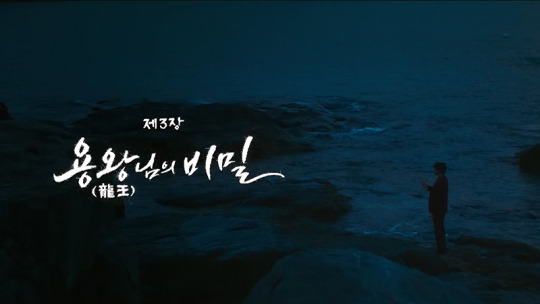
구미호뎐 | Tale of the Nine Tailed - Lost in Translation EP03
The saga continues: part three in a series in which my sister and I pick our way through all the (mis)translations, humour, and cultural subtext that dropped from the fan-subbed version of TotNT. Thank you so much to everyone who bought us coffee - this one’s for you. ;)
Before we begin, for anyone just joining us: EP01 / EP02.
We pick up back where we left off last episode with Yeon dressing Ji Ah’s wound.
Yeon’s line that’s subbed, “Stop being a crybaby” can be a bit hard to translate. The word he uses is ‘eomsal,’ which literally means, ‘the exaggeration of pain; feigning pain; a great fuss about nothing.’ So he’s essentially saying she’s overreacting. I'm not a fan of the use of the word ‘crybaby’ here though personally.
“Long time no see, Lee Yeon.” > > > 12 Hours Earlier.
We see Thirsty meet his ignominious end in a toilet (we never got character names for these guys so I’m just going to call them ‘Thirsty’ and ‘Hungry’).
Elsewhere on the island, Rang fishes a curse doll with the man’s picture on it out of the surf. That’s quite the atmospheric shot. Point to the director.
Episode 03 Title Card: The Secret of the Dragon King
We open the following morning as Ji Ah and the man who found the body (who Ji Ah refers to as ‘Captain’) examine the scene.
Sub: “Being at sea wasn’t enough and he drowned himself to death.” I’m not sure that sentence even makes sense. I would have translated the man’s line as: “Ho~ Let no one say he wasn’t a seaman. He managed to kick the bucket by drowning [even on dry land].”
Sub: “Talk about it being all for nothing. This is what he gets after throwing himself at his life.” Um, what now? The line is: “Human lives are so futile. And after he clung so viciously to life, too.”
Lol Yeon. “I see someone threw a party.” I like this sub. What he literally says though is: “Oh~ Looks like it was a really special night.” (‘special’ here is in English).
Sub: “He smells like a stinky fish.” What Yeon literally says is: “Ugh, a smell like rotting fish is coming from this kid!” Yeon refers to the man as ‘yae,’ which literally means ‘this kid,’ but can also be used to refer to inanimate objects. So, either way...pfft
Appropriately, the BGM playing as Pyung Hee casts her curse is ‘Shaman.’
Back over to Yeon and Ji Ah as they investigate the body. The chyron on the screen reads: ‘The first survivor of the Milky Way (Deceased)’ Irony-(probably)-not-intended.
We get another chyron not long after, over a shot of Pyung Hee’s father’s head being returned to shore that reads: ‘Seo Gi Chang (Died aboard the Milky Way)’
Lol None of this has stopped Yeon from nomming on his banana milk. I had thought the milk made him seem like a little kid, but according to Korean fans, it’s also, apparently, commonly enjoyed by old men. heh
Sub: “Besides, they’re not good looking enough.” This is a mistranslation. Yeon’s line is literally: “And besides, I don’t like the look of their faces.” What he means, though, is the feeling they give off, rather than their actual ‘looks.’ It’s a common expression in Korean. If I was translating instead of explaining, I would probably render this as, “I don’t like the look of them.”
As Ji Ah drags him out, however, Yeon can be heard saying, “Ah~ I judge people by their looks~!” I’m 98% sure this is another LDW ad lib. Basically, LDW made a joke of his previous line, as if to say Yeon cared about the look of them because they weren’t attractive enough, when really his line meant they seemed shady. It’s almost as if he predicted the bad sub...
We get a brief scene featuring the second (and only named) survivor of the Milky Way, Jin Shik. Oh, and his headless ‘visitor.’ Creepy.
The music underscoring Hungry gorging himself on raw meat is making everything worse (or possibly better, if disturbing is your jam)
I’ve said it before, but I would watch an entire series of Yeon and Ji Ah being a supernatural investigative duo.
Pfft Yeon refers to Seo Gi Chang as ‘the head’ (mogaji). I’m not sure if I should call that indelicate or irreverent. It’s a bit of both, really.
Yeon’s line here is subbed as, “What happened on the boat?” but it should more properly be: “What did you do on the boat?” He’s not just asking after the sequence of events; the line is a clear accusation.
Sub: “We met an unexpected storm that day.” Actually: “Rough wind and waves hit the side of the fishing boat.” (i.e. causing it to capsize)
I appreciate that Yeon sits back here and allows Ji Ah to take the lead.
So, as it turns out, the 11th hell is actually a fishing boat (I’m sure the cast of 1N2D will back me up on this).
Fun fact: This sequence was filmed in a green screen pool and then made to look like the middle of the ocean with CG.
As an aside, I love that Ji Ah deduced the whole story on her own and that she uses that knowledge to corner Hungry psychologically. Also, that her strategy proves more effective than Yeon’s threat of violence. It’s not so much a ‘you catch more flies with honey,’ as a ‘brain over brawn’ sort of deal.
Ji Ah: You were frightened, weren’t you? Twenty-eight days straight on a perilous life boat without water or food. They’re the perfect conditions for a person to go mad, aren’t they? First-degree burns from the hot August sun striking your body mercilessly, the boat pitching about all day; despite not having eaten, you feel as if you’ll throw up. Clenching your teeth and waiting to be rescued only works for a day or two. The more you think about it, the angrier you get. ‘Why, me? Why?!’ Around the fifth day was the crisis point. Since, in that time, not a drop of rain had fallen. Dehydration would have set in first. [...] But it’s odd, isn’t it? For having starved for 28 days, you lost too little body mass. [...] What did you eat?
Meanwhile, Yeon’s contribution to all of this is: “And you couldn’t have used a delivery app in the middle of the open ocean where there’s no wifi signal.” Pfft He has, of course, caught on to her strategy. As usual, though, he decides to take the cheeky route.
Side note: I find it interesting that, in this universe full of monsters, the first incident Yeon and Ji Ah end up investigating together turns out to be an entirely human horror.
Yo. Hungry deciding Ji Ah is food is just...ugh. Never trust a cannibal.
Luckily for Ji Ah, her guard dog fox is on the job.
Over to Rang, who asks a weeping Pyung Hee what she’ll give him in return for granting her ‘wish’. We don’t get to see her answer him, but it was included in the backstory collection.
It’s unclear to me just how much Rang is involved in ‘granting’ Pyung Hee’s wish. Like, is he the one fueling the curse somehow, or did he just teach her what she needed to know? I’m inclined to believe it’s more the latter.
We cut to Taluipa at the Afterlife Immigration Office, who’s pissed that someone’s messing with her Death List. There’s a fun mythology-related chestnut in this scene: when Hyeonuiong comes running in, he’s carrying a watering can. Taluipa accuses him of having been watching dramas, but Hyeonuiong insists he was watering the Uiryeongsu.
The chyron for it reads: ‘The Uiryeongsu. A tree that measures the sins of the dead by the weight of their clothes when they’re hung on it.’ The hanja for ‘Uiryeongsu’ (衣領樹) literally mean ‘clothing-amount-tree,’ so its name is essentially its function. In traditional mythology, it grows on the near bank of the Samdocheon. This is also the same tree that the Uiryeong’geom (geom = sword) mentioned in EP13 is made from.
“You watered a tree for 3 hours?” Pfft Hyeonuiong and watering can, exit stage right.
Minor detail: I just realized I can actually see from Taluipa’s List in this scene that one of the two fishermen is named Kim Gil Sang. Still not sure which one though, so I’m going to stick to calling them Hungry and Thirsty.
The Dragon King Scroll
Back over to Ji Ah, who examines a creepy scroll hanging in Jin Shik’s vacant quarters. Once again, the show cuts into its own dramatic tension with a moment of levity as Yeon startles both Ji Ah and me by popping open his bag of snacks with a massive bang. The contrast between Ji Ah, who’s in serious investigator mode, and Yeon, who just continues his one-gumiho snack parade, blasé as can be, adds humour to an otherwise grim situation.
Yeon’s response of, “Oh. Sorry.” is in English, making it sound, if possible, even less sincere.
On the off chance that anyone was wondering, the snack Yeon claims as his favorite here is 솜짱 (somjjang). According to the Korean fans again, this is also a food commonly enjoyed by elderly people.
Subs: “Do you know how many people in Joseon died during the 50 years of war? 3.5 million. I’ve seen more deaths than all the funeral companies in this country.” This is another case of diagonal translation. Yeon’s line is more properly:
Yeon: Between the Imjin War and the Manchu War, do you know how much of the population of Joseon-era Korea was lost in just 50 years? 3,500,000. I’m a guy who’s seen more funerals than all the funerary companies in Korea put together.
[Note: Yeon is talking about The Japanese Invasions a.k.a The Imjin War (1592-1598) and The Qing Invasion of Joseon a.k.a. The Manchu War (1636)]
As a linguistic aside, Yeon refers to himself here as a ‘nom’ (rhymes with ‘home’). If you read the breakdown of EP02, you’ll recall that ‘nom’ can mean anything from ‘guy’ to ‘bastard.’ It’s not that Yeon means to call himself a bastard, though. It’s only that the typical alternative here (i.e. ‘person’) carries the implication of 'human.’ Since Yeon is, of course, not human, he opts for ‘nom’ instead. The word gets a lot of mileage in this show in relation to all the supernaturals for that reason.
Lol This exchange about the Dragon King was great. Point to the writer. I would translate it as:
Yeon: You’re right, but it looks nothing like him.
Ji Ah: You’ve...seen him?
Yeon: Back when I was a mountain god. Well, in today’s terms you’d say we attended a leadership conference together. They over-glamorized him. He’s not this good looking.
Ji Ah’s reaction is perfect too. Her, ‘I don’t even know where to begin with that statement so I’m just going to move on’ look came across loud and clear.
Yeon’s line as he leans over Ji Ah’s shoulder is subbed: “This is just like ‘Where’s Wally?’” In Korea, the game is called ‘find the hidden picture’ (‘sumun keurim chatgi’). So the line is actually: “What is this, ‘find the hidden picture’ or something?” I’d say there’s a 50/50 chance this line was another ad lib by Lee Dong Wook.
On an entirely different cultural note, ‘Where’s Wally?’ is know as ‘Where’s Waldo?’ in North America and exactly nowhere else. Don’t ask...
This scene features the first mention we get of Imoogi. Imoogi are among the most famous Korean mythical creatures. In most tellings, they are essentially proto-dragons, though occasionally they can be baby dragons. For example, one imoogi tale claims its imoogi was the son of the Dragon King (the same one Yeon attended a ‘leadership conference’ with). Most of the lore agrees that if an imoogi stays submerged in deep water for a thousand years, it earns the chance to become a dragon, though the caveats vary widely, and many imoogi fail. Finally, while the imoogi in TotNT is evil, imoogi aren’t categorically so; some are good, some aren’t.
Rang and the Mudang
Fun fact: Kim Beom explained in his Instagram LIVE that he chose to wear a red suit partially because the color gave off the feeling of a villain, but also because it contrasted well with the green of the forest. He also named this as his favorite Lee Rang outfit.
For anyone keeping track, Rang speaks to the mudang in banmal. She, in return, addresses him as ‘Lee Rang-nim’ and speaks very respectfully.
Okay, there are a couple of things to unpack in Rang’s following exchange with the mudang:
Mudang: The Corrupt God, King of the Wicked. He is Lee Ryong-nim.
Rang: [Laughs] What’s with that? Ugh, I seriously just cringed! If you slap a fancy title* from the next world in front of its name, does a snake become a dragon?
First, the mudang’s line here is said in an archaic cant. Second, ‘Lee Ryong’ (properly pronounced, ‘i-ryong,’ since there’s actually no ‘L’ in ‘Lee’), is another name for imoogi.
Finally, when Rang says ‘a fancy title from the next world,’ he’s referring to a posthumous name/title. Nearly every kingdom to have occupied the Korean peninsula has used posthumous titles (시호), most often for deceased royalty. By giving one to Imoogi, the mudang is venerating him. Rang mocks this, seizing on Imoogi’s failure to become a dragon. (Let no one say he and Yeon aren’t brothers).
The subs have Rang referring to Yeon as just ‘Yeon,’ but he actually calls him ‘Lee Yeon.’ That’s a very impersonal way to refer to one’s older brother, which is, of course, intentional on Rang’s part. It serves as another linguistic cue to the audience as to how Rang regards Yeon at this point.
A note on the evening primrose: tvN released a short blurb about it, since, as far as I can tell, the mythology was invented for the show. It reads:
Evening primrose that has grown while feeding on the blood and flesh of corpses is the same as poison to gumiho; if they so much as touch its powder, their bodies catch flame.
While the subs consistently just say ‘evening primrose,’ this should more properly be ‘burial ground evening primrose,’ which is how the various characters refer to it.
Fun fact: ‘Evening primrose’ in Korean is ‘dalmaji-kkot’ (달맞이꽃), which means ‘flowers that welcome the moon’.
Sub: “Half-brothers, to be exact.” The term Rang uses in Korean is quite literally, ‘brothers from different stomachs,’ so it refers specifically to half brothers who share a father but who have different mothers. I mention it only because Korean viewers will have been given slightly more information about their familial relationship here than was provided in the subs.
Back over to our leads, as Yeon urges Ji Ah to leave the island post-haste. His line is subbed: “I’m saying you may die if you stay here.” That’s a perfectly fine translation. For anyone curious, though, his line is quite literally: “I’m saying if you stay here, [the conditions are] perfect for dying.”
Sub: “That’s none of your business.” Yeon’s line is more properly: “That’s not for you to know.”
Ji Ah’s response to this is very literally: “I have no intention to go home for a reason I don’t know. So Lee Yeon should find the person Lee Yeon came here to find. I have to know why my parents came to this island.” This is the first time Ji Ah uses Yeon’s full name as a second person pronoun (so basically to mean ‘you’) when speaking to him. It’s hard to make generalizations about any form of address that don’t have multiple exceptions, but in this case, using his name is a more neutral, and somewhat more familiar, alternative to some of the other pronouns she’s been using when speaking to him. To my sense, it softens her rejection of his advice a little bit.
Back to Rang. His line is a bit awkward to translate, but essentially what he says is, ‘Calling my brother a ‘mountain god’ is an overstatement/ putting it nicely.’ I might approximate this as, ‘Sure, my brother was called a mountain god.’ This is the only time in the entire drama that Rang refers to Yeon as ‘uri hyung,’ and it kills me a bit that it’s not out of fondness, but rather derision. ㅠㅠ
Similarly, when Rang says, “I’m a fox, after all. I have to repay eunhye properly,” he is, of course, using eunhye sarcastically.
The subtitle here once again says ‘the underworld,’ but Rang’s line is actually: “I’m going to go to hell, without fail. Together with Lee Yeon.” The subs really need to do a better job of distinguishing between hell and the afterlife.
We see Ji Ah instruct Jae Hwan over the phone as to what to search for in the library records. She’s split off from Yeon since we last saw them.
Elsewhere on the island, Yeon also makes a call, only his is to Halmeom (Taluipa) to ask about Imoogi. When this episode first aired, I thought it was odd that Yeon was using ‘Imoogi’ as if it were a name, since this would be like referring to Yeon as ‘Gumiho.’ He later taunts Terry-Imoogi about just that though (i.e. not even having a proper name), so obviously it was an intentional decision on the writer’s part.
Sub: “If by chance Ah Eum was born again into this world, I can’t let that thing coexist with her.” This sub went a bit sideways. The ‘by chance’ has been mis-attributed. The line is properly: “There’s no way I could possibly (i.e. by any chance/under no circumstances can I) let such a thing exist in a world in which Ah Eum has been reborn.” Yeon is already sure that Ah Eum has been reborn at this point. He’s saying that because she’s been reborn, he can’t allow Imoogi to coexist with her under any circumstances.
Rang vs Ji Ah
Ji Ah returns to Pyung Hee’s to find ‘Pyung Hee’ reading Moby Dick. This is an ironic enough choice of literature to clue her in to the fact that this isn’t really Pyung Hee. Smart cookie.
On a character note, I loved that Ji Ah’s knowledge of, and love for, world literature was threaded believably throughout the drama in a way in which it feels natural that she caught on to Rang’s hint here. Point to the writer.
Again, for anyone keeping track, Ji Ah and Rang speak to each other in banmal, as has been the case since Rang revealed himself at Ji Ah’s house in EP01. Not because they’re close, obviously, but because they have zero respect for one another. It’s a bit of a power play on Ji Ah’s part, too, since she’s (hundreds of years) younger.
Over to Yeon, who barges into the local market owner’s personal quarters to interrogate him. His line when he catches sight of the scroll on the wall is subbed: “Look at this.” This should more properly be: “Check these people out. There’s one here too.” The word he uses that I translated as ‘these people’ is ‘i-geot-dul,’ which is very literally ‘these things,’ so I sort of understand the confusion in the subs. He means the islanders though, not the scrolls. In contrast, ‘there’s one here too’ does actually refer to the scroll.
The knife Yeon throws hits directly over the slit pupil of the scroll dragon’s eye. Nice aim.
Back to Ji Ah and Rang. When Ji Ah accuses Rang of orchestrating the deaths of the Milk Way survivors, ‘to distract us,’ what she says quite literally is ‘to cover our eyes and ears.’
When Rang applauds Ji Ah’s deductive abilities, his line is subbed, “Awesome.” This should more properly be, “Outstanding,” or, “Exceptional.” I honestly believe he’s being sincere in his praise. Being Rang, though, he’s probably just delighted this makes her more challenging to toy with.
Having completed his interrogation, Yeon’s eyes change as he erases the man’s memory of the event. I suspect the reason Yeon is so cavalier about revealing he’s a gumiho is because he can basically ‘undo’ it whenever he wants using this power.
Ji Ah’s quiet, “I decline” is so satisfying. Also the way Rang pulls back in surprise haha I guess he’s not used to being turned down.
Rang’s exchange with Ji Ah is subbed as: “Loosen up. Why be so stiff when it’s just good old me?” / “Let me give you some advice since that’s how you feel. Don’t gamble with another’s tragedy just for kicks. There’s a word for people like you, you know. A colossal jerk.” This is difficult to translate, and I think the subs have done a pretty good job, but a closer translation would be:
Rang: Augh— So uptight! Are you going to keep acting this uptight, just between us* (literally, ‘between you and me’)?
Ji Ah: Between you and me, then, I’ll give you just one word of advice: Don’t carelessly role the dice atop others’ misfortune. People call jerks like you ‘sleazy bastards.’
[*Note: Rang’s phrasing implies that they’re somehow close/on good terms, but he’s being sarcastic, of course.]
First off, the word Rang uses for ‘uptight’ (빡빡하다) means ‘stiff; uptight; rigid; inflexible; strict.’ By this, he’s referring to how she never lets her guard down. I don’t know that any of those words properly conveys that, though.
Second, while I translated Ji Ah’s line about the dice very literally here (in keeping with the spirit of this post), I actually like how the subs handled it from a translation/subtitling standpoint.
Finally, the subs have Ji Ah calling Rang ‘a colossal jerk,’ but the term she actually uses (‘yang’achi saekki’) is a much stronger expletive. ‘Yang’achi’ is a term for a thug, gangster, or hoodlum. ‘Saekki’ literally means ‘child of.’ In practical use, though, it’s close to ‘bastard.’ (I really didn’t think I’d be explaining the finer points of Korean expletives when I started this series, but here we are). I approximated this as ‘sleazy bastard’ above.
Pfft Rang being genuinely offended at Ji Ah’s language. Jo Bo Ah talked a bit about what she thought of all the explicit language Ji Ah uses towards Rang in her wrap interview.
Subs: “When he finds what he wants, you’ll be begging for mercy.” No idea where they got 'begging for mercy.’ What Rang actually says is, “When he finds what he wants, you’ll see hell.” Unlike in the subtitle, Rang’s warning actually has substance to it, since he’s referring to the fact that, once Yeon identifies Ji Ah as Ah Eum’s reincarnation, their fate with Imoogi will repeat itself.
By the time Yeon rushes back to Pyung Hee’s, Rang is long gone. His line subbed as: “What did he say?” is, quite literally, “Lee Rang, that nom, what’d he say?” This use of ‘nom’ manages to come off as fairly mild. (He may be a jerk, but he’s Yeon’s jerk).
Ji Ah’s response has undergone cultural translation to become: “Even when I order pizza, I never go for half-and-half. I always choose just one.” Honestly, though, I don’t know that it was necessary. What she actually says is: “Even when I order chicken, I don’t go for half-seasoned, half-fried; I’m the type to just pick one.”
This scene was originally longer but part of it got deleted. They released the clip, though, so I’ll translate the full exchange here:
Ji Ah: I'm saying I turned him down, your younger brother. Since I bet on this fox.
Yeon: Let no one say you aren’t a learned (wise) woman. Is that all?
Rang (voiceover): Don't trust Lee Yeon too much.
Ji Ah: That's all. But...you said the two of you are brothers.
Yeon: Yeah. We’re brothers.
Ji Ah: Why are you so hellbent on destroying each other?
Yeon: It seems like you don’t know since you’re an only child, but, as a rule, the relationship between siblings is a lot like noir, just without the guns.
Ji Ah: There you go, deflecting the question again. Is that a secret, too?
Yeon: If you ever happen to run into that guy again just the two of you, no matter what, run fast. That kid* despises humans. Especially humans that look like you.
Ji Ah: Why do you keep taking cracks at people's faces?
Yeon: ...I'm hungry.
Ji Ah: Why don’t you take the opportunity to pack up and leave while you still can? Your younger brother...it seems he’s preparing some sort of special event.
Yeon: That’s what I’m waiting for.
*Note: The word Yeon uses that I translated as ‘kid’ is ‘jashik.’ This is another word that, depending on how it’s used, can either be fond or rude. ‘Jashik’ literally means ‘[one’s] child,’ but it’s also commonly used in the sense of ‘punk.’ It’s a bit softer than nom. You wouldn’t use it to refer to yourself, though.
Ji Ah’s “Why do you keep taking cracks at people’s faces?” (meaning he’s insulting/taking issue with how she looks), is referencing their exchange the previous night when he told her not to smile because she was ugly.
We cut briefly to Shin Joo eating at the Snail Bride as he sizes up Yoo Ri from a distance. Come to think of it, we never got this BGM for the Snail Bride, either...
Ramen Heart-to-Heart
Lee Yeon’s one-gumiho meokbang continues. I feel like Yeon has been nomming on something in nearly every scene this episode.
The BGM while Yeon and Ji Ah eat is a remix of Yeon’s theme, ‘The Fox’s Wedding Day.’
Sub: “Just because these ladies wear baggy pants in floral prints doesn’t mean they have kind hearts. Get digging, and you’ll find all sorts of dirty secrets.” Yeon’s line is more literally:
Yeon: Living is all the same [everywhere]~ Just because grannies in the countryside wear flower-patterned pants doesn’t mean that even their insides are flower-patterned. If you start digging, venomous and insidious years come pouring out.
Ji Ah’s response then plays off of Yeon’s turn of phrase: “Is that the case for you too? I just wondered, ‘With what pattern did you live all those long years?’” (referring to the ‘pattern’ of his heart).
On a minor cultural note: the word Yeon uses is ‘mombbae pants’ (몸빼바지), which are a fashion(?) staple in the countryside. You’ll know what I mean if you run the hangeul through a google image search. That’s where the subs got ‘baggy’ from even though Yeon doesn’t explicitly say it.
Sub: “Why have you been searching for your parents all this time?” Yeon’s line is more properly: “Then what about you? What has made you wait for your parents for such a long time?”
Sub: “I’m the same. I’m waiting for the one I miss.” I would have translated this as: “I’m waiting for someone I miss,” which is literally what he says.
Sub: “Why did you part ways when you still miss her this much?” This is a bit hard to translate into natural-sounding English. The word Ji Ah uses is ‘mi’ryeon,’ which means ‘lingering attachment.’ So her line is quite literally: “Your face is so full of lingering attachment, how did you come to part ways/break up?”
Sub: “The first being I loved was a human girl who ended up dying. It’s why I’m still hung up on her. Happy now?” Hmm... I would translate Yeon’s line as:
Yeon: My damn* first love was a human of all things, but she died, so I’m foolishly unable to let go of my lingering attachment. Happy now?
[*Note: Yeon is cursing is the phenomenon of first love itself, not Ah Eum.]
His statement is witty, because the word he uses for ‘foolish’ is also pronounced ‘mi’ryeon.’ In this case, though, 'mi’ryeon’ means, ‘foolhardy and dense enough to be stubborn to a preposterous degree.’ Which is probably a fair assessment given he’s been waiting 600 years. The sub for this line made it sound like he’s saying, ‘I’m hung up on her because she’s a human girl who died,’ which would just be weird.
Shin Joo Meets Yoo Ri
Okay, minor detail, but what exactly was Yoo Ri trying to accomplish here before Shin Joo stopped her from entering an off-limits area of the Snail Bride?
The BGM here is called ‘Skip a Beat’ (‘Kanju Jump’). I found the track title slightly surprising since it’s actually taken from an ad lib made by Kim Yong Ji (Yoo Ri) in a later episode.
For anyone keeping track, Shin Joo and Yoo Ri are speaking in a mix of banmal and jondaetmal in this scene.
We next see Shin Joo on the phone with Yeon, whining about the whole ordeal and asking an unsympathetic Yeon to come back and retrieve his necklace for him.
Yeon’s line that’s subbed as, “Deadly?” could mean more than one thing. The line is literally, “What? The thief was deadly?” The word for ‘deadly,’ though, could equally mean that she was a knockout (i.e. gorgeous). It’s probably a bit of both.
Subs: “There’s nothing more pathetic than being blinded by a woman’s beauty...” / “But you also ruined your life by falling for beautiful woman.” For the record, neither of them actually uses the word ‘beauty/beautiful’ here. I would translate this exchange as:
Yeon: You... The most pathetic thing in the world, is being blinded by a woman, and...
Shin Joo: But being blinded by a woman and wrecking your life is something Lee Yeon-nim did too, isn’t it?
Yeon: What, you punk?!
Lol Yeon’s “What, you punk?!” is a familiar refrain whenever Shin Joo unwittingly(?) insults Yeon. The word is ‘imma’ (임마) or sometimes ‘inma’ (인마). Yeon consistently uses the former.
‘Bad Fate’
Subs: “Why is that branch broken? It must’ve hurt.” Yeon is actually personifying the tree here, which makes sense seeing as he can communicate with it. So his line is more literally: “Now why has this kid gone and made a fuss breaking [his] branch? It must’ve hurt.” Which is cute.
I actually really appreciated this short scene of Yeon healing the tree. Yeon may no longer be the master of Baekdudaegan, but this scene showed that it’s still very much a part of who he is; not just his powers, but the care he has for the forest.
Fun (?) fact: It turns out this simple scene was actually a huge pain to film.
Subs: “I hope you grow well.” Actually: “Eat well and grow well.” I realize that sounds awkward in English, but the line is a directive. He’s once again speaking to the tree.
Sub: “The wind is blowing from the northwest. Something is coming.” I would have translated this as: “A northwest wind blows... Something is coming.” That’s partly a tonal choice, but it’s also a more literal reflection of the original Korean.
We finally catch back up to the end of EP02, as Jae Hwan calls Ji Ah from the library to tell her what he’s found. This time, we see her connect the first dead body in 1954 to what the forest spirit told them more explicitly.
The dates of the four incidents are: August 13, 1954; August 25, 1961; September 6, 1979; and September 7, 1987. Ji Ah quickly deduces that these all work out to be the same date on the lunar calendar: July 15th. In 2020, that works out to be Wednesday, September 2nd. If you’ll recall, the wedding at the start of EP01 was held on August 29, so it’s only been 3 days since Yeon and Ji Ah crossed paths at the wedding hall.
“Long time no see, Lee Yeon.” What is it with Imoogi and choking Yeon?
Subs: “You should’ve let me go.” More precisely: “I know, right? You should have let me go.”
Yeon’s final “What are you?” should probably have been subbed as: “I’m asking what you are!” since both his tone and phrasing have grown more insistent.
Subs: Our ill-fated relationship would’ve ended if you hadn’t stopped the boat from crossing the Samdo River. More literally:
Jimoogi: Our ak’yeon should have ended. That is, if only you hadn’t stopped the boat from crossing the Samdocheon.
The word the subs translated as ‘our ill-fated relationship’ is ‘ak’yeon’ (悪縁), which literally means ‘bad fate.’ In contrast to the broader, ‘destiny’ sort of fate (‘un’myeong’) however, ‘yeon’ (縁) is inherently relational. It refers specifically to the fate between two people (or even between a person and a place). ‘Ak’ (悪) means ‘evil.’ So 'ill-fated’ is a bit misleading as a translation since the word actually refers to the relationship between Yeon and Imoogi (i.e. mortal enemies), rather than the fact that Yeon and Ah Eum’s story ended tragically (as in, ‘an ill-fated love’).
WAIT. Subs: “No. That woman is born with a face that only I can recognize. And I don’t see it in you.” What?? That doesn’t even make sense. Yeon’s line is:
Yeon: No. That woman is born carrying a sign that only I can recognize. You don’t have it.
Obviously, Yeon is referring to the fox bead, and I’m fairly sure that was apparent since the line was intercut with the scene in which he imparts the bead to Ah Eum, but that seems like a pretty critical line to fudge up.
Jimoogi: “You really don’t know anything, do you, Lee Yeon?” It’s weird to me that they have Imoogi addressing Yeon as just ‘Yeon’ in the subs. That makes it seem like they’re friends or something...
Subs: “The scar is gone.” Actually: “The wound disappeared.”
Deadball
Subs: “We hate each other too much to play catch. I actually meant to kill you.” Wait, WHAT?! Yeon’s line is:
Yeon: Our relationship is too makjang for that. That was meant to be a deadball, actually.
Makjang, for the uninitiated, is a slang word taken from the phrase ‘the final scene’ (‘majimak jangmyeon’) that has come to refer to an entire genre, as well as particular dramatic elements or conventions of Korean storytelling. Dramabeans explain the term here. When Yeon says his relationship with Rang is ‘makjang,’ he’s essentially saying it’s overly fraught, not that he hates his brother.
He also doesn’t say he meant to kill Rang. ‘Deadball’ is a Korean baseball term for a pitch that hits a player (typically causing the game to be paused). So Yeon’s just saying he meant for the ‘ball’ to hit Rang, rather than for Rang to catch it.
On a personal note, it really bothers me when the subs spread all over the internet and they’re wrong like this. I don’t mind slight changes in phrasing or wording, but when they grossly misrepresent the characters like this it can be a bit upsetting. It’s no wonder I sometimes feel like I watched a completely different drama. ㅠㅠ
Yeon’s cheeky smile™ XD
The BGM in this scene is actually ‘The Forest of the Agwi.’
Subs: “Run away.” Yeon’s line is quite literally: ‘Get away from here,’ or even, ‘put distance between here and you.’ I mention it because I really appreciated that, despite all the danger she confronts, Yeon never once tells Ji Ah to ‘run away’ (‘domang ga’). His second ‘run away’ in the subs is also just him telling her to hurry up (literally ‘go quickly’).
The following banter between the brothers is something I mentioned in an ask a while back because all the humour had been lost in translation. To recap, though, one recurring joke the show uses plays off the word for ‘bastard/son of a bitch,’ which translates literally as ‘child of a dog’ (kae-saekki). As you might imagine, this gets a lot of mileage in relation to Rang, our resident ‘baby fox’ (agi yeou) a.k.a. ‘child of a fox’ (yeou-saekki):
Rang: This is domestic violence, you know?
Yeon: (Nodding) They say you’re supposed to raise wild children* with a firm hand (literally: hit them as you raise them), but I couldn’t do that, so I ended up raising a fox child into a dog child (son of a bitch), didn’t I?
Rang: And who was the jerk who kicked that child (saekki) to the curb? You treat me like a stray dog any chance you get.
Yeon: My little brother, I’ll have to gift you a muzzle this Christmas.
Rang’s line was subbed: “You keep blaming it on me, when you were the one who turned me into an orphan.” which I find fairly problematic since that makes it sound like Yeon killed Rang’s parents. It’s also just plain wrong; to the extent that I’m not even sure what went wrong in the translation process.
The word Yeon uses here for ‘wild children’ is ‘horo jashik’ (호로자식), which many Koreans understand to mean something like a barbarian child, but the true origin, as it turns out, is a parentless child. It’s also a term used predominantly by elderly people heh
Finally, because the dog jokes dropped out ‘muzzle’ became ‘mouth guard’ in the subs, which is both less funny and less sensical. The two are also conceptually opposed, since ‘muzzle’ implies that Yeon means to protect the world from Rang whereas ‘mouth guard’ is more about protecting Rang.
As Ji Ah continues to put distance between herself and the brothers, she happens upon the mudang’s house, which she immediately clocks as such from the obangi.
I like that Ji Ah doesn’t immediately call the mudang out for lying, but instead continues to question her knowing she’s lying. Sometimes the lies people tell can be as telling as the truth.
When Ji Ah questions her, the mudang tells her the fishing ritual is held during the ‘Ghost Festival’. This is a Buddhist festival similar to All Souls Day. In Korean it’s called ‘Baek Joong Nal’ (literally ‘hundred-gather-day’) meaning ‘the day when all the spirits gather.’ It falls on the full moon of the seventh lunar month (so July 15th of the lunar calendar), which is, of course, the date Ji Ah identified as the day when the murders were taking place. That’s why we get the zoom in and the flash to the newspaper dates: Ji Ah has put everything together.
Chyron: “Obangi (五方旗) A five-colored flag symbolizing ‘life, death, illness, sacrifice, and ancestors’”. This is the quick quotes version. Obangi have their roots in the Chinese philosophy of Wuxing, but for more on that, I’ll refer you to Wikipedia. In Korea, the colors of the obangi (red, blue, white, black, and yellow) are known as the five orientation colors, and are closely tied to both shamanism and fortune telling. You’ll notice these same colors flying outside the fortune teller’s in EP06.
I also appreciated that Ji Ah didn’t just foolishly drink the tea here. She was properly on her guard. It’s only that she mis-identified the source of danger.
Back over to our fox brothers. Rang’s line is subbed: “That was plenty of time.” This is more properly: “I think I’ve bought more than enough time by now.” So he’s actually quite overt in telling Yeon exactly what he'd been up to.
Subs: “Don’t you know why she ended up on this island?” More closely: “Do you still not get it? Why that woman ended up coming to this island of all places?”
We see the mudang encircle the creepy well with burial ground evening primrose to ward against Yeon, who is currently searching the island for Ji Ah to no avail.
Subs: “You tricked your mom while you were in her womb.” This is a bit difficult to translate. The word the mudang uses that was translated as ‘tricked’ is ‘ggweda,’ which means to ‘lure’ or ‘entice.’ So what she means is that the part of Imoogi that was reincarnated with Ji Ah ‘lured’ her mother to the island by sending her recurring dreams.
Gumiho
Lol Yeon: “I am the original mountain spirit, the master of the mountains and streams. Lift this darkness and lead me to her!” This is more literally:
Yeon: I am the original mountain god, the master of your mountains and streams.* Part this darkness and lead me to that woman!
[*Note: ‘Mountains and streams’ here can also be taken to mean ‘nature’ at large.]
Lol The line is met with silence and the soft hoot of a lone owl. That’s basically the director’s version of *crickets* isn’t it?
This line is another rare case in which Yeon speaks archaically, and it serves to make the command sound more formal and potentially magical. It’s also worth noting that he’s addressing the forest directly as a whole here (thus the ‘your’).
Fun fact: When Lee Dong Wook did his TotNT VLIVE, his promotional team made him perform this line again live just to mess with him haha
The BGM here as Yeon heads off through the forest led by his (supernatural?) fireflies is ‘Opening Title: The Legend of the Fox.’ It sounds vaguely Harry Potter-ish to me (not complaining).
For the record, Ji Ah is now speaking to the mudang in banmal out of disdain.
Sub: “Be a sacrifice. You are a very special child.” Pfft ‘Be a sacrifice’ sounds oddly funny to me. Her line is: “Become a sacrifice. I’m told you’re a very special child.” So the implication is that this information came from someone/something else.
Does anyone know what BGM this is as Yeon sprints though the forest? I think it might be another unreleased track, but I’m not positive...
Yeon’s “Halt!” is once again in olden speech. It indicates linguistically that he's in Gumiho mode.
Out of curiosity, is it not odd for people watching with subs when Ji Ah’s only utterance is ‘Lee Yeon’ but the subs just say ‘Yeon’?
Subs: “This has nothing to do with the old master of the mountain. Why don’t you keep walking?” I would have translated this as: “It is a matter unrelated to the former master of the mountain. Beg, go along your way.” She’s once again using olden-speech in her second sentence.
Lol Sub: “Says the living corpse.” I like this sub. Yeon’s line is quite literally: “With the ‘juje’ of a living corpse...” ‘Juje’ is essentially your station or lot in life, and it’s used almost exclusively derogatorily.
Sub: “Who was it that provided you with longevity you don’t deserve?” More closely: “Who was it? The one who gave you a lifespan so much longer than you deserve?”
Yeon: “I asked you whom you serve!” (literally ‘what’ you serve). Yeon once again drops into an archaic cant for this line. It serves to underline his full age and gives his demand an extra air of authority.
Yeon’s TAILS. I can’t believe this was the last we saw of them. ㅠㅠ Personally, I interpreted the firey tails as being a sort of ‘shadow’/ projection of his actual tails, which I assumed were actually more physically there (since he talks about shampooing them in the teaser interview). My sister thinks differently, though. Guess we’ll never know...
The BGM for this sequence is naturally ‘Gumiho.’ If you read our EP01 breakdown, you’ll know I was fully expecting this to be Yeon’s theme. But no, it’s the whimsical 'The Fox’s Wedding Day’ instead haha
Okay, Yeon just casually smiting the mudang is pretty badass. Seeing as he can command lightning, I’m pretty sure he was joking when he told Ji Ah, ‘even gumiho are afraid of electricity.’
If by chance you wondered what was going though Yeon’s mind when he smote the mudang, it’s featured in the EP03 subtitle poster.
I appreciated that Yeon just accepts Ji Ah at her word here when she tells him all she needs from him is one arm for support. I feel like in most dramas the male lead would have just forcefully swept the heroine off her feet amidst her protests, which I always find more problematic than romantic.
For that matter, when it became clear that Ji Ah really did need help, I appreciated that she didn’t act shy or coy and just accepted being carried without making a big deal of it.
Pfft The way Ji Ah’s eyes flash when Yeon tells her the mudang was just a human being says it all.
Yeon: “So you say... Excuse me, but you nearly died just now, you know?” This line is once again cheekily in jondaetmal.
*Ominous close up of the well*
Thank You
We catch up with Shin Joo at the supermarket as he talks to Yeon over the phone.
Shin Joo’s ‘PD-nim’ has once again become, ‘the director lady’ in the subs. *Sigh*
Subs: “Your love story is more than just famous among us.” Actually: “Just how famous is Lee Yeon-nim’s love story in our world? It’s obvious your younger brother* must have been playing tricks!”
Shin Joo refers to Rang here as ‘donsaeng-bun’ (younger sibling + polite word for person) for the same reason he calls Rang, ‘Lee Rang-nim.’ It’s an extension of his regard for Yeon, rather than for Rang himself.
Lol Shin Joo hanging up on Yeon. His love for supermarkets and fried chicken are actually in his character profile. Apparently, they’re what convinced him living as a human was worth the existential crisis that came with it.
Sub: “I’m too much of a human to easily fall asleep after such an event. Join me.” More literally: “I’m human, so on a day like today I can’t sleep sober. You* have a glass, too.”
The word Ji Ah uses for ‘you’ here is ‘ja’ne’ (자네), which is a polite term... except it’s only used to refer to people younger than you. So’s she’s talking down to him politely haha This is what prompts Yeon’s line that follows it:
Sub: “I never said anything since it could make seem old-fashioned, but you’re too informal with me when you don’t even know my age.”
Yeon: I kept holding it in thinking you’d call me an old fart, but you’re [using] banmal really blatantly. Just how old do you think I am?”
Yeon’s ‘Just how old do you think I am?’ is rhetorical. It’s not that Ji Ah is necessarily unaware of his true age, but rather that she acts as if she is.
Sub: “Those over 60 are universally considered as grandpas.” Actually: “You know everyone over 60 can be called a grandpa, right?”
Pfft Sub: “Be as informal as you like.” What Yeon literally says is, “Please lower your speech,” but he uses very respectful language to say it. I’m not sure if he’s being sarcastic, or if he just hates the thought of being considered a grandpa that much haha It’s probably a bit of both.
Aww Ji Ah promising to protect Yeon. I luff her.
Ji Ah: "Do I perhaps have something you’re looking for?” I love that she doesn’t miss a thing.
Lol Yeon: “Who am I, Jesus? Just drink what you have.”
The Vanishing
Subs: “Don’t ever resort to cursing people again. Karma can sting.” Quite literally: “You were lucky you kept your life, but don’t do such a thing* as cursing others ever again. They return, you know. Back on the one who casts them.”
*Yeon uses the disparagement marker ‘ddaui’ (따위) to refer to the act of cursing someone here. You may recall it from our EP01 breakdown.
Ji Ah chooses this moment to come running in to announce that the island has turned into a ghost town over night, which is enough to make even Yeon pause, perplexed.
I love the way Yeon and Ji Ah exchange looks here on the dock. They don’ t know what’s up yet, but they intend to find out.
‘Blue Moon’~~~ This worked great scored over the drone-camera pan out. I may be slightly biased, though.
And that concludes Episode 3. Once again, thank you to everyone who commented or left feedback on the last episode! Never hesitate to send me your thoughts, even if they’re just to say what you found funny or surprising. It helps me to know what’s of interest for one thing, but I also just enjoy chatting about the show. ;)
A brief note on pronunciation/notation: for words like ‘sa’ingeom’ and ‘mi’ryeon,’ the apostrophe is there just as a pronunciation guide. So in the case of the former, to indicate that it’s pronounced ‘sah-in’ and not ‘sine’ or ‘sane.’ Similarly, for the latter, the apostrophe is just to indicate that this should be pronounced ‘mi-ryeon’ and not ‘mir-yeon.’ I could have just as easily done this with ‘Hyeon’ui’ong’ except that’s a lot of apostrophes and I set an earlier precedent of not. It’s not an aspiration or anything fancy. Hopefully that makes sense.
Once again, I’d like to credit my sister for being the main researcher and fact-checker for these, in addition to weighing in on all the translations. I don’t always take her advice, but I do always appreciate it haha.
Thank you also to everyone who bought us coffee! Your support is truly felt and appreciated ♡ As usual, this took an ungodly amount of time, so every coffee helps haha. For anyone just joining us (or not), if you’d like to see more of these, please consider buying us a coffee. If you follow the link, you can buy a $2 cup of virtual coffee. This helps me to gauge how much interest there is, and also how much value people place on these. If you cared enough to read all the way to the end, please at least consider it. Once I’ve established there’s enough interest, I’ll proceed with Episode 4. ;)
26 notes
·
View notes
Video
happy new year everyone! hoping that this one is much better than the last.
456 notes
·
View notes